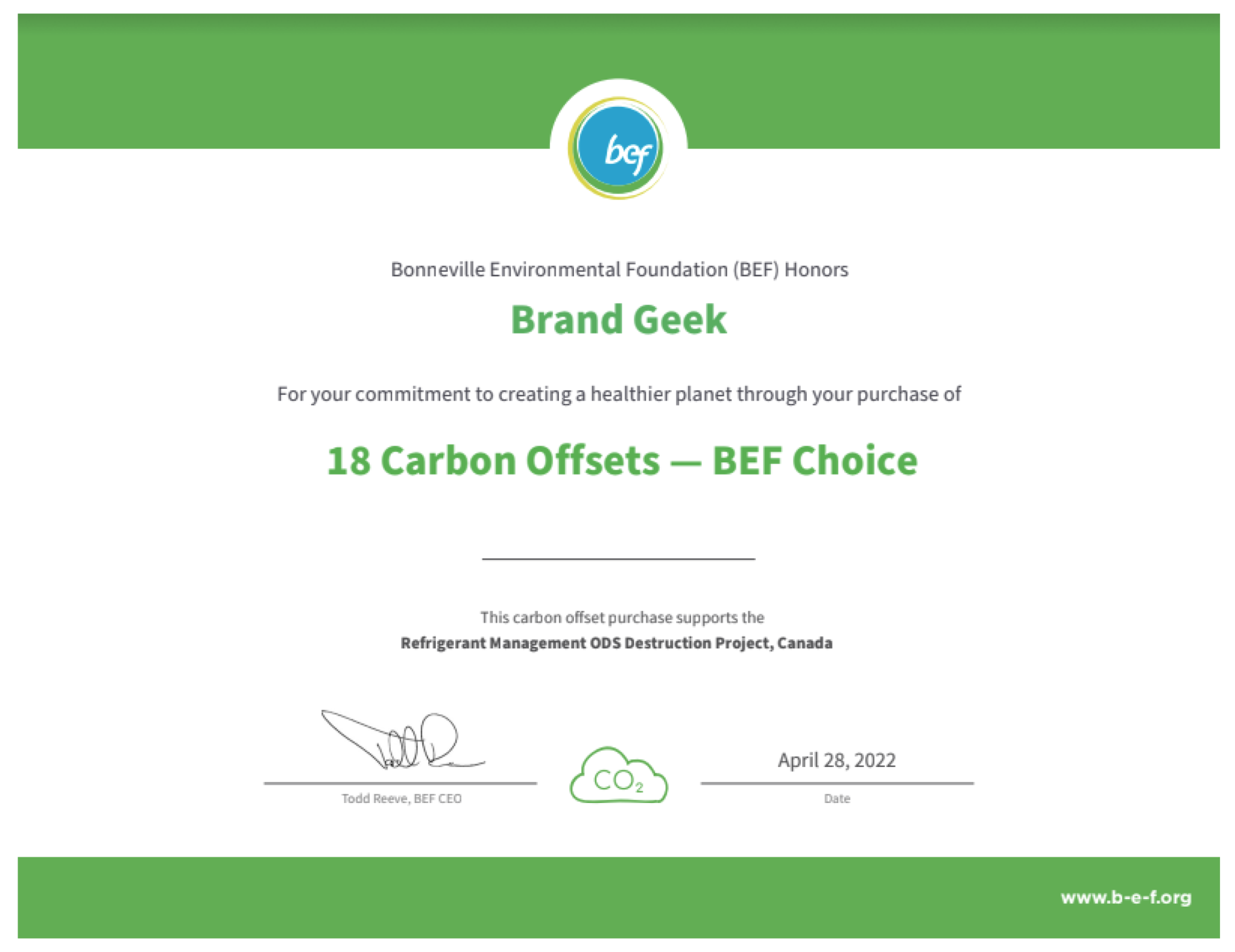Brandgeek proudly supports Mountain Area Preservation and is humbled to be…
GreenUP’s First Annual Green Business & Government Tour
Reno/Tahoe’s brand until recently was America’s Adventure Place. Apparently, that brand officially was shelved around September, 2009, though it appears we have yet to come up with a new one.
Our community is (or was) marketed as an outdoor wonderland (which it is!). Sadly, however, when you arrive at our airport, you’ll find no recycling bins. And, you’ll see no explanation of why this is. (How hard is it, really, to make a few signs that state Recycling Services Provided by Waste Management, Recycling Removed from Waste Stream Offsite — if that is in fact true, which I hope it is). Nope, not in Reno. Instead, the message you get when you land at the Reno airport is that while we sell “playing outside,” we don’t care enough about our natural environment to do something as simple as recycling. Seems pretty senseless to me.
*********************************************************************************************
CORRECTION:
Unlike the US Senate, I don’t think it’s right to “edit (alter) the record” with no record of the alteration. Sometimes we get it wrong. Or completely wrong.
I apologize to the Reno-Tahoe Airport Authority (RTAA). Recycling bins are everywhere at the Reno Tahoe airport. I’ve probably used them:
[iframe http://brandgeek.net/wp-content/uploads/2011/05/Reno-Airport-Recycling-Bin-Locations.pdf]Todd Welty, Environmental Programs Manager for RTAA informed me that of the 24 bins depicted on the map, 12 were placed in 2008 with additions in 2009 and 2010. I just never noticed and really thought they still were absent. Pretty embarrassing, maybe even senseless.
*********************************************************************************************
Fortunately, there are some amazing people and organizations in our area who are doing wonderful things. Included among them are the changemakers who run GreenUP, which recently became a Chapter of SIGBA. GreenUp hosted a Tour De’ Green on Saturday which featured environmentally conscious business and governmental initiatives at:
The Regional Transportation Commission (RTC) of Washoe County, Nevada
Great Basin Community Food Co-op
This post will touch on a few of the highlights from our visit to each of the entities, while tomorrow’s post will focus solely on how awesome the City of Reno is. Yes, really!
Carol Perry, RTC’s Trip Reduction Specialist, arranged for a hybrid bus to drive us around Reno for our day long journey. RTC is responsible for public transportation, maintenance of streets & highways, and urban transportation planning. RTC recently constructed the 4th Street Station, which opened in October, replacing the former bus depot. The new building has been submitted for LEED Gold certification based on numerous environmentally conscious attributes, including:
* Natural lighting
* High efficiency heating, air & H20 systems
* Water saving landscaping (native plants / drip system)
* Storm water management — drains down to natural vegetation to reduce runoff into Truckee river
* Energy efficient lighting
* Solar panels
* Recycled asphalt & concrete
* Reflective roof & pavement to reduce heat island effect
* Groundwater heat pump optimizes water temperature for heating & A/C
Next, we walked around the city of Reno, uncovering the cities seemingly covert $20,000,000 investment in energy efficiency and renewable energy, which saves the city $1,335,403/year and 10,985,642 kWh/year in energy savings. More about that tomorrow.
From our walking tour of Reno, we headed to Patagonia. Patagonia is my favorite brand. I learned even more reasons why on Saturday. Patagonia makes incredibly durable and stylish clothing. It recycles old poly-propylene clothing and makes new clothes from it, which are designated by an “e” in the Patagonia catalogue. Through its Footprint Chronicles, it allows consumers to track the impact of certain products from design through delivery. It also donates 1% of its gross sales to environmental groups as part of its membership in 1% for the Planet (on whose Board I served from 2006-2009). Patagonia’s warehouse expansion is LEED Silver certified, based on the following features:
* Manages storm water runoff & parking lot pollution through use of detention ponds & impervious pavers
* Native plants used to lower ambient temperatures
* Use of white roof & pavers to reduce heat island effect
* Installation of waterless urinals & low flow toilets
* Radiant heating system
* Installation of R30 insulation on roof R12 in walls
* Full time monitoring system
* Use of FSC certified woods
* Radiant heating through panels hanging from ceiling
* Lots of natural light through skylights in warehouse – 75% natural light & light sensors
Next, Tom Stille gave us a tour of the River School Farm. Wow! The River School exists to educate people about composting, vegetable growing and farming. Tom is concerned for our region’s food security and hopes to encourage others to grown their own food and to support local & regional commercial farmers. In addition to the educational services Tom’s organization provides, they also perform agricultural consulting services, such as floodwall and berm restoration work they are performing for the new Wal-Mart on 2nd Street and creating an ESA (Employee Supported Agriculture) for Patagonia — growing food on Patagonia’s land and selling it to the employees at a weekly farmer’s market.
Like RTC and Patagonia, the River School also boasts a host of environmentally conscious building features, such as:
* PV & hydronic solar — runs through 3 buildings as radiant heat, pre-heats domestic water, & heats hot tub
* Utilizing greywater systems — started in 1998 with the greywater in the bunkhouse laundry room
* Switching all lighting to LEDs
* Building out of Earthplaster (depicted in the photos above), which can be used just like stucco, though it must be shielded from moisture or it crumbles
* Engaging in bio-intensive organic farming
* Raising backyard chickens
Great Basin Community Food Co-op
The Great Basin Co-op began with 3 farmers. It now helps 53 producers (farmers and ranchers) sell their local products locally. The Co-op’s current location is 500 square feet, from which it did $95,000 worth of business last month! Clearly, there is a demand in our region for high quality, non-GMO food. Annual membership in the co-op is $15 and it provides a 10% discount on all items in the store, which means it pays for itself usually on your first visit. The co-op has 200 member workers and 3,000 members. The co-op provides local food both to its members and to several area restaurants. It will be opening a new 7,000sf facility in October, 2011. The new facility ultimately will include a cafe, organic salad bar, smoothie/juice bar, wine and beer and a community center. The co-ops new facility will offer organic bread, pre-made sandwiches and meals, as well as local frozen veggies and have greater bulk foods and local, organic free range meats. The community kitchen in the new facility will enable the co-op to reduce spoilage, as they will soon be able to cook food that’s no longer “pretty” but still nutritious. The new co-op location is one block from the river, and close to the bus line, so the hope is that it will encourage a lot of non-vehicular traffic.
At NV Energy we got to ride in a Nissan Leaf and a Chevy Volt. NV Energy has a small solar array that will power two electric cars at a time. There’s also a single charging station at Einstein Bagels in Reno. The Leaf is purely electric and gets approximately 100 miles per charge at a cost of a penny per mile. The Leaf will fully charge in 6-7 hours. The Volt gets 25% of its energy from renewable sources and will charge in under 4 hours. Both cars were surprisingly zippy, though we all know that’s not too good for mileage.
Our tour ended, of course, at the bar. Buckbean Brewing is a Reno microbrewery that cans its own beer right there in the brewery. I asked Brew Master Dan Kahn if he’d turn the canning machine on for us, but I guess I did not ask nicely enough as he was not inclined to do so. Buckbean chose to can its beer for environmental reasons. Aluminum cans are recycled more often than bottles. They empty cans are super lightweight and shipping them thus causes less harm to the environment, as does shipping full ones. Shipping full beer bottles results in trucks driving at less than full capacity because of the weight of the filled bottles, whereas a truck full of cans can still take on additional weight. It also takes 30% less cardboard to ship cans than it does to ship bottles. Buckbean also sells its beer in growlers and it will re-fill a growler from any micro-brewery, not just its own. I am not a beer drinker, but my husband really enjoys Buckbean’s Orange Blossom beer.
I learned a lot and was inspired on every stop of the GreenUP tour, which exceeded my expectations! I hope that the tour continues to grow and foster friendly competition for environmentally responsible initiatives in the Truckee Meadows community.

 RTC
RTC







Thank you Lara for a great write-up from a great tour.
SiGBA greenUP! expects to make this an annual event. We thank everyone who participated in this ground breaking event!
Thanks, Donna!
Hi Lara,
Great post. I thought you should know that the RSCVA’s current campaign slogan for our region is “Far From Expected”.
http://smartblog.wordpress.com/2009/11/19/reno-tahoe-usa-is-far-from-expected/
The campaign has been in full release since December of 2010 with limited response. Not at “sticky” as “America’s Adventure Place”.
Keep blogging!
Larry
Thanks, Larry!
Apparently the part about the lack of airport recycling is bogus. More about that in my next comment.
I read that A Little West of Center was ruled out, which is too bad; I think it’s great!. The RSCVA website features a nice Bighorn, but no tagline; I wonder why.
Thanks for reading and commenting.
The